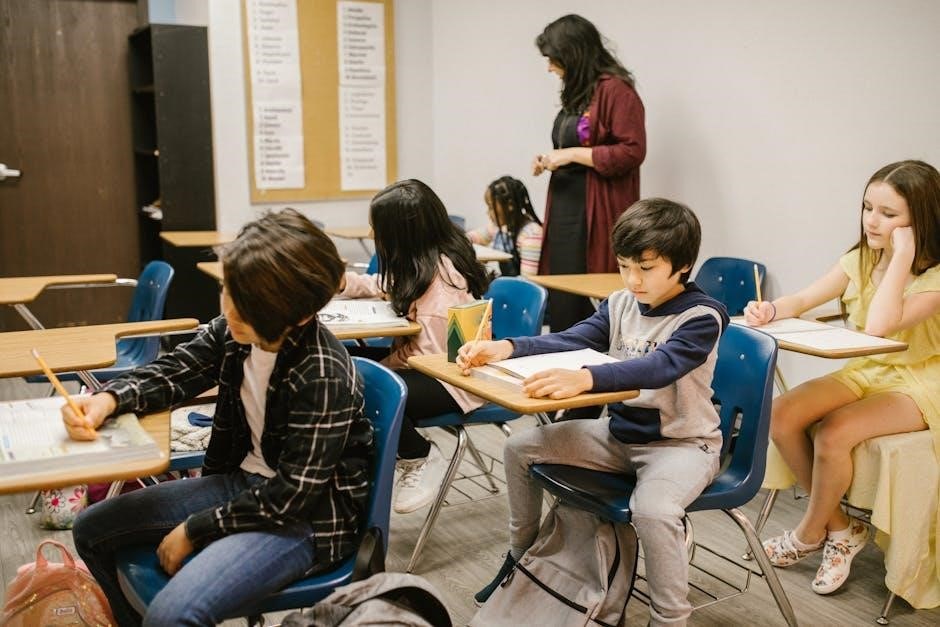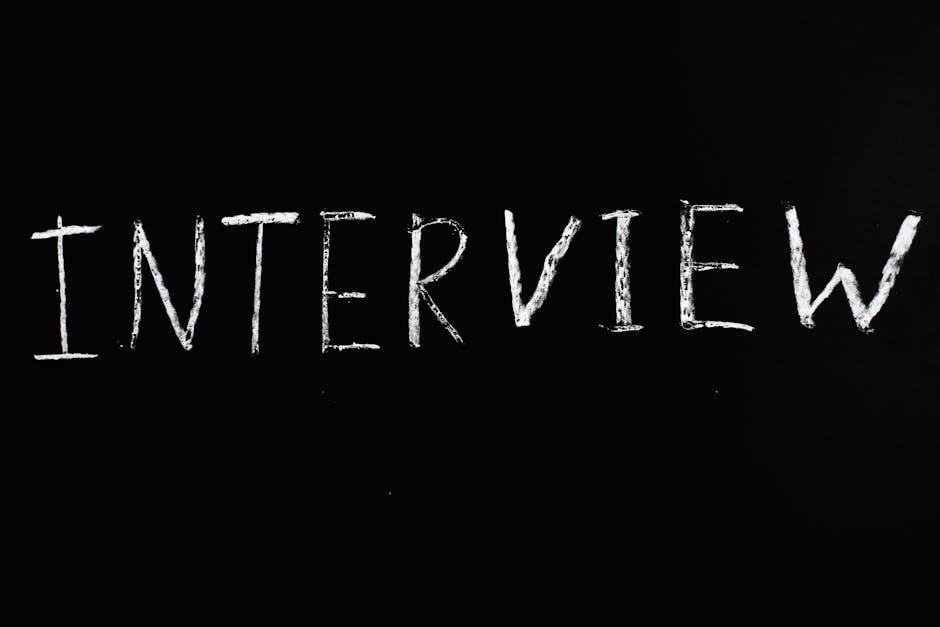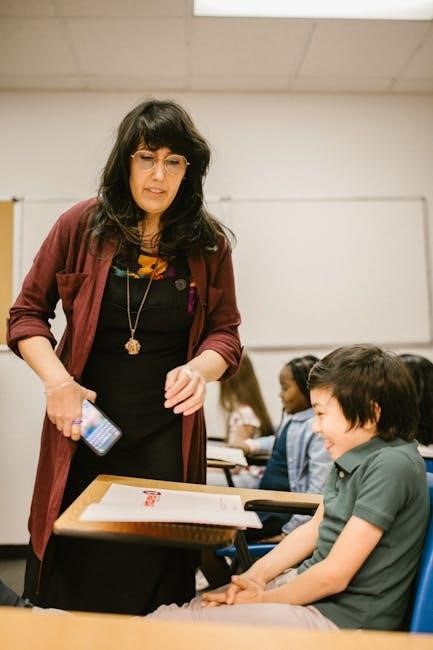
Preparing for a school counselor interview requires understanding the role and practicing responses to common questions. This guide provides essential questions, sample answers, and tips to help you excel, ensuring you showcase your skills and passion effectively;
Overview of the Importance of Preparation
Preparation is crucial for acing a school counselor interview. Understanding common questions, practicing thoughtful responses, and showcasing your skills and passion are essential. A well-prepared candidate demonstrates professionalism and readiness to support students effectively. Reviewing potential questions and answers, along with strategies for presentation, can significantly boost confidence. Utilizing resources like PDF guides provides convenience and ensures thorough readiness, helping you stand out in a competitive field and align with the school’s objectives.
Key Areas to Focus On
When preparing for a school counselor interview, focus on understanding the role, showcasing collaboration skills, and aligning personal goals with school objectives. Highlighting experiences in student support, academic guidance, and crisis intervention is vital. Emphasize communication strategies, teamwork with educators, and innovative approaches to student well-being. Demonstrating knowledge of modern counseling practices and readiness to implement new programs can set you apart. Tailor your responses to reflect your commitment to fostering a positive school environment and student success.
Understanding the Role of a School Counselor
A school counselor is a vital link between students, teachers, and administrators, providing academic, social, and emotional support to foster student success and well-being.
Primary Responsibilities and Expectations
School counselors are expected to provide academic, social, and emotional support to students, collaborating with teachers and administrators. They guide students in career planning, address personal issues, and foster a positive school environment. Key responsibilities include counseling individuals and groups, developing support programs, and maintaining confidentiality. Counselors must stay informed about educational trends and communicate effectively with all stakeholders. Expectations also include fostering inclusivity and taking initiative to improve student outcomes and overall well-being.
Difference Between a School Counselor and a Guidance Counselor
While often used interchangeably, school counselors and guidance counselors have slight differences. School counselors focus on comprehensive programs, academic advising, and social-emotional support, often working within a school counseling framework. Guidance counselors traditionally emphasize career and educational guidance, though modern roles overlap. Both aim to enhance student success, with school counselors increasingly addressing mental health and systemic issues. The terms reflect evolving practices in student support, with school counselors adopting a broader, more integrated approach to student well-being and development.
Common School Counselor Interview Questions
School counselor interviews often cover scenarios like student conflicts, academic challenges, and collaboration with teachers. Be ready to discuss your approach to these situations and your qualifications.
General Interview Questions
General interview questions for school counselors often focus on your background, motivation, and goals. Examples include, “Tell us about your educational background,” “Why do you want to become a school counselor?” and “What are your professional goals?” These questions help assess your suitability for the role. Be prepared to discuss your qualifications, experiences, and aspirations clearly and confidently. Practicing these responses will help you present yourself as a strong candidate.
Scenario-Based Questions
Scenario-based questions assess your problem-solving skills in real-life situations. Examples include, “How would you handle a student conflict?” or “Describe a strategy for supporting a student with behavioral issues.” These questions evaluate your ability to think critically and respond appropriately. Be prepared to provide specific examples from your experience, demonstrating your approach to challenging situations. Practice articulating clear, effective solutions to showcase your practical skills and adaptability as a school counselor.
Qualifications-Focused Questions
Qualifications-focused questions highlight your skills and suitability for the role. These may include inquiries about your educational background, professional experience, and specific certifications. For example, “How does your experience prepare you for this position?” or “What strategies would you use to support student development?” Be ready to align your qualifications with the school’s objectives, demonstrating how your skills meet the needs of the students and the institution. This shows your readiness to contribute effectively.

Collaboration with Teachers and Administrators
Effective collaboration with teachers and administrators is crucial for creating a supportive learning environment. Teamwork ensures aligned strategies to address student needs and promote academic success.
Examples of Successful Teamwork
Successful teamwork in school counseling involves collaborating with teachers and administrators to address student challenges. For instance, working together to develop behavior intervention plans or academic support strategies demonstrates effective teamwork. Sharing student progress data with teachers and administrators ensures aligned efforts. Additionally, organizing parent-teacher-student meetings to discuss individualized plans showcases strong communication and collaboration. These examples highlight how teamwork fosters a cohesive support system for students’ academic and emotional success.
Strategies for Effective Communication
Active listening, clear articulation, and empathy are essential for effective communication in school counseling. Regularly scheduling meetings with teachers and administrators ensures alignment on student needs. Utilizing digital tools like emails or shared documents can enhance collaboration. Being approachable and maintaining confidentiality fosters trust with students and parents. Effective communication strategies ensure a supportive environment, enabling students to thrive academically, socially, and emotionally. Consistent and transparent interactions are key to building strong relationships within the school community.

Professional Goals and Aspirations
School counselors often aim to enhance student success and well-being through tailored support programs. Professional growth and leadership roles align with the school’s mission, fostering a positive impact on students and the community.
Short-Term vs. Long-Term Goals
School counselors often balance short-term and long-term goals to support student success. Short-term goals may include implementing new programs or building strong relationships with students and staff. Long-term aspirations might involve advancing leadership roles or expanding support services. Aligning these goals with the school’s mission ensures a cohesive approach to fostering academic, social, and emotional growth. Demonstrating a clear vision for both immediate and future contributions highlights your commitment to the role and the school community.
Aligning Personal Ambitions with School Objectives
Aligning personal ambitions with school objectives ensures a harmonious and purposeful approach to the role. School counselors should aim to integrate their professional goals, such as fostering student well-being or advancing equity, with the school’s mission. By understanding the institution’s priorities, counselors can tailor their strategies to support both individual student needs and the broader educational goals. This alignment not only enhances collaboration but also creates a cohesive environment for academic and personal growth, benefiting both students and the school community.

Strategies for Acing the School Counselor Interview
Thoroughly researching the school, practicing responses to common questions, and showcasing your skills and passion are key strategies for excelling in a school counselor interview.
Preparation Tips
Research the school’s mission and counseling philosophy to align your answers. Review common interview questions and practice thoughtful responses. Develop a concise elevator pitch highlighting your qualifications. Organize your materials, such as certifications and references, for easy access. Engage in mock interviews to refine your delivery. Understand the school’s specific needs and be ready to discuss how your skills align with them. This preparation ensures confidence and a polished performance during the interview.
Presentation and First Impressions
Dress professionally, ensuring your attire reflects the school’s culture. For women, a jacket with a skirt or trousers and a blouse is appropriate. Men should wear a suit and tie. Arrive early to demonstrate responsibility and punctuality. Maintain a positive attitude, good posture, and eye contact. A firm handshake and warm smile create a welcoming first impression. Be prepared to articulate your qualifications and how they align with the school’s mission, showcasing your enthusiasm and readiness for the role.
Innovative Ideas for the School Counseling Role
Innovative ideas for school counselors include integrating technology, promoting inclusivity, and implementing mindfulness programs. These strategies foster a supportive environment, enhancing student well-being and academic success.
Modern Approaches to Student Support
Modern approaches to student support include integrating technology, mindfulness programs, and data-driven interventions. School counselors now use digital tools for accessible services, such as online counseling platforms and mental health apps. Mindfulness practices help students manage stress and build resilience. Data-driven strategies allow counselors to identify at-risk students early and provide targeted support. These innovative methods ensure holistic care, addressing academic, social, and emotional needs effectively while fostering collaboration with educators and parents.
Implementing New Programs or Initiatives
Implementing new programs requires a structured approach, starting with needs assessment and stakeholder collaboration. School counselors should design initiatives that align with school goals, ensuring they address specific student needs. Piloting programs, gathering feedback, and making adjustments are crucial steps. Effective communication and training for staff ensure smooth integration. Monitoring progress and evaluating outcomes help sustain successful initiatives, fostering a supportive environment that enhances student success and engagement.

Strengths and Weaknesses
Recognizing your strengths and weaknesses is crucial for a school counselor. Highlight your adaptability, empathy, and organizational skills. Acknowledge areas for growth, such as time management or delegation, and explain how you are addressing them. Demonstrating self-awareness and a commitment to improvement shows maturity and professionalism.
- Strengths: Adaptability, empathy, strong communication.
- Weaknesses: Time management, delegation, and overcommitting.
Self-Assessment for the Role
Self-assessment is vital for school counselors to identify strengths and areas for growth. Recognize your ability to connect with students, manage conflicts, and implement support programs. Acknowledge challenges, such as balancing caseloads or maintaining confidentiality, and outline strategies for improvement. Demonstrating introspection and a willingness to evolve showcases your commitment to professional development and student well-being.
- Strengths: Creativity, conflict resolution, organizational skills.
- Weaknesses: Delegation, public speaking, or handling high-stress situations.
Turning Weaknesses into Opportunities
Every weakness can be transformed into a strength with self-awareness and growth. For instance, if you struggle with time management, prioritize tasks and seek tools to enhance organization. If public speaking is challenging, enroll in workshops to build confidence. Acknowledging areas for improvement demonstrates maturity and a proactive approach to personal development. Highlighting specific steps taken to address weaknesses shows your commitment to excellence and resilience in the school counselor role.
- Time management: Implement structured planning.
- Public speaking: Engage in professional development.

Questions to Ask the Interviewer
Asking thoughtful questions during your interview demonstrates engagement and preparation. Inquire about the school’s counseling program, student needs, and collaboration opportunities with teachers to align your goals with the school’s mission and showcase your proactive approach.
- What are the primary challenges faced by students here?
- How does the school support counselor-student relationships?
Understanding the School Environment
Understanding the school environment is crucial for aligning your counseling strategies with the institution’s culture and needs. Ask about the school’s specific challenges, such as student behavior or academic performance, and how counselors currently address these issues. Inquire about the support systems in place for students, including resources for mental health or academic advising. This demonstrates your commitment to adapting your approach to the school’s unique context and ensuring a smooth transition into the role.
- What are the most common challenges students face here?
- How does the school currently support student well-being?
- What resources are available for counselors to assist students?
Gaining Insights into the Position
Gaining insights into the position helps you understand the school’s expectations and how you can contribute effectively. Ask questions about the day-to-day responsibilities, how success is measured, and the school’s vision for the counseling program. This demonstrates your interest in aligning your skills with the school’s goals and shows that you are proactive in understanding the role’s specifics.
- What are the primary responsibilities of this position?
- How does the school measure the success of its counseling program?
- What support systems are in place for counselors?

Downloading School Counselor Interview Questions in PDF
Downloading a PDF guide of school counselor interview questions and answers provides convenient access to essential preparation materials. This format allows you to review questions and responses anytime, ensuring you are well-prepared for your interview.
Benefits of a PDF Guide
A PDF guide offers numerous advantages for interview preparation. It provides a comprehensive collection of school counselor interview questions and sample answers in a portable format, allowing easy access anytime, anywhere. This convenience enables focused study and efficient review of key topics, helping candidates to organize their thoughts and practice responses effectively. The PDF format ensures that all necessary information is readily available, making it an invaluable resource for successful interview preparation.
Accessing Essential Resources
Accessing essential resources like a PDF guide for school counselor interview questions and answers is straightforward. These guides are widely available online, offering comprehensive lists of questions and sample responses tailored to the role. They often include tips for preparation, insights into the interview process, and strategies for making a strong impression. By leveraging these resources, candidates can efficiently prepare, ensuring they are well-equipped to address a variety of scenarios and showcase their qualifications effectively during the interview.
Preparation is key to acing your school counselor interview. Utilize PDF guides for essential questions, sample answers, and tips to boost your confidence and success.
Final Tips for Success
To excel in your school counselor interview, thoroughly research the school and practice answering common questions. Be ready to discuss your strengths, experiences, and how you align with the school’s mission. Dress professionally, arrive early, and engage confidently. Prepare thoughtful questions for the interviewer to demonstrate your interest and initiative. Follow up with a thank-you note to leave a lasting impression. These steps will help you present yourself as a passionate and qualified candidate.
